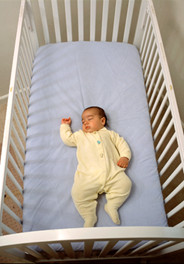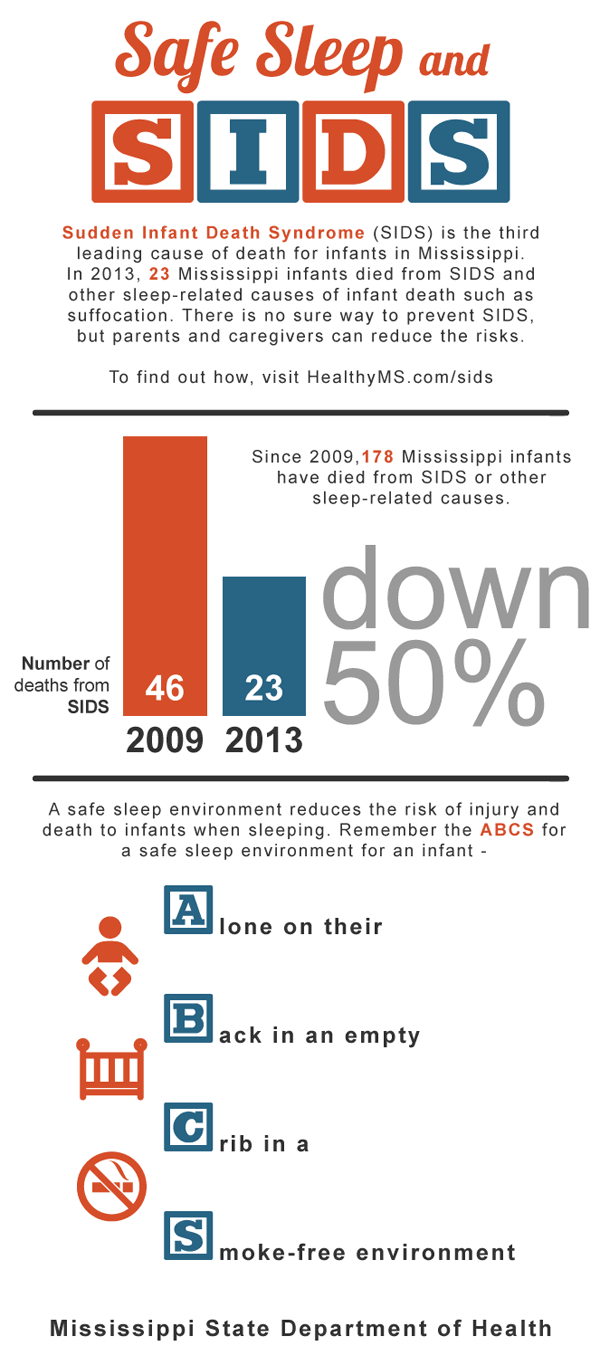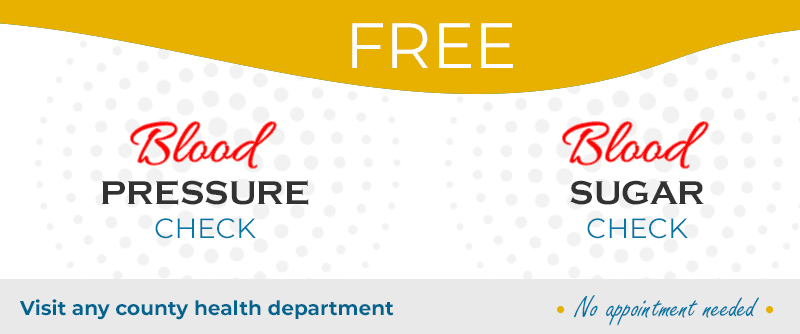
Sleep-related deaths (SIDS and SUID) are the third-leading cause of death for Mississippi infants. Fortunately, parents and caregivers can take steps to reduce the risk of sleep-related deaths. The Mississippi State Department of Health offers counseling, referral and training on prevention of sleep-related deaths and helping those affected by SIDS and SUID.
About SUID/SIDS
Sudden Unexpected Infant Death (SUID) is the death of a infant less than one year of age that occurs suddenly and unexpectedly and whose cause of death is not immediately obvious prior to investigation.
Sudden Infant Death Syndrome (SIDS) is the sudden death of an infant less than one year of age that remains unexplained after complete investigation, which includes an autopsy, examination of the death scene and review of the symptoms or illness the baby had before dying.
Mississippi SUID/SIDS Facts
- SIDS/SUIDS is the third leading cause of death for infants in Mississippi.
- Babies are more likely to die of SUID/SIDS when they sleep on their stomachs.
- About one in five SUID/SIDS deaths occur while an infant is being cared for by someone other than a parent.
- In 2021, 51 MS infants died from SUID/SIDs.
How You Can Reduce the Risk of SUID/SIDS
A safe sleep environment is free of pillows, blankets and other objects in the crib.

You can lower your baby's risk of SIDS and other sleep-related causes of infant death by taking the following steps. Make sure that others caring for the infant (child care providers, relatives, friends, and babysitters) also follow these recommendations.
- Place your infant completely on his or her back to sleep at night and for naps.
- Use a firm crib mattress covered by a fitted sheet.
- Keep soft objects and loose bedding out of the crib. Remove pillows, quilts, comforters, crib bumpers, sheepskins, stuffed toys and other soft objects from the infant's sleeping area.
- Your baby should not sleep in an adult bed, on a couch, or on a chair — alone, with you, or with anyone else — due to the danger of accidental suffocation.
- Do not allow your infant to get too hot during sleep. The infant should be lightly clothed and the bedroom temperature should be comfortable for a lightly clothed adult. Use a sleep sack or similar sleepwear instead of blankets to help keep your baby warm and safe.
- Give your baby a dry pacifier that is not attached to a string for naps and at night to reduce the risk of SIDS.
- Breastfeed your baby to reduce the risk of SIDS. If you bring your baby into your bed to breastfeed, put him or her back in a separate sleep area, such as a safety-approved crib, when you are finished.
- Do not smoke while pregnant or around your baby and never allow others to smoke around your infant. Get free help quitting smoking
Special Steps Women Can Take
- Get regular health care during pregnancy.
- Never smoke, drink alcohol, or use illegal drugs during pregnancy or after the baby is born.
- Follow your health care provider's guidance on your baby's vaccinations and regular health checkups.
- Avoid products that claim to reduce the risk of SIDS and other sleep-related causes of infant death.
- Do not use home heart or breathing monitors.
- Give your baby plenty of tummy time when he or she is awake and when someone is watching.
Guidelines for Child Care Facilities
Child care facility such as daycares and after-school care also have important roles to play in preventing sleep-related deaths. This document provides recommendations and tools for child care facilities.
SUID/SIDS Resources
- Mississippi infant mortality reports
- Facts for Childcare Workers
- Safe to Sleep Interactive Room NIH
- Video: Safe Sleep for Infants CDC
- Video: Safe Sleep Environments: For Grandparents and Caregivers NICHD
Organizations
- Continuing Education for Nurses: SIDS Risk Reduction NICHD
- First Candle/SIDS Alliance
- March of Dimes
- National Healthy Mothers, Healthy Babies Coalition
- CDC Sudden Unexpected Infant Death and Sudden Infant Death Syndrome
- Safe to Sleep Campaign
- U.S. Consumer Product Safety Commission: Crib Information Center
Mississippi State Department of Health
570 East Woodrow Wilson
Osborne Building, Suite 200
Jackson, MS 39216
Phone: 601-576-7619


